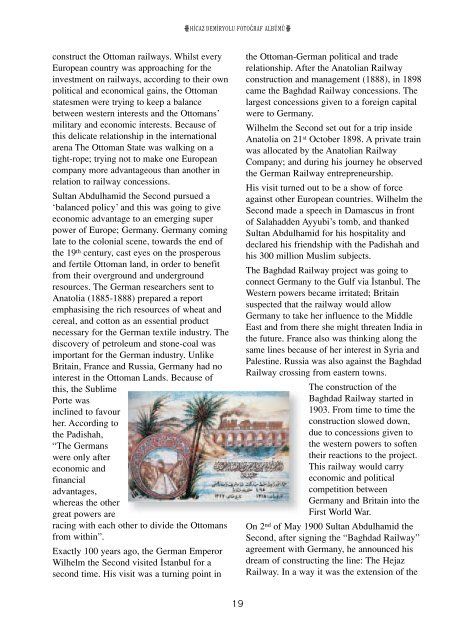You also want an ePaper? Increase the reach of your titles
YUMPU automatically turns print PDFs into web optimized ePapers that Google loves.
X H‹CAZ DEM‹RYOLU FOTO⁄RAF ALBÜMÜ C<br />
construct the Ottoman railways. Whilst every<br />
European country was approaching for the<br />
investment on railways, according to their own<br />
political and economical gains, the Ottoman<br />
statesmen were trying to keep a balance<br />
between western interests and the Ottomans’<br />
military and economic interests. Because of<br />
this delicate relationship in the international<br />
arena The Ottoman State was walking on a<br />
tight-rope; trying not to make one European<br />
company more advantageous than another in<br />
relation to railway concessions.<br />
Sultan Abdulhamid the Second pursued a<br />
‘balanced policy’ and this was going to give<br />
economic advantage to an emerging super<br />
power of Europe; Germany. Germany coming<br />
late to the colonial scene, towards the end of<br />
the 19 th century, cast eyes on the prosperous<br />
and fertile Ottoman land, in order to benefit<br />
from their overground and underground<br />
resources. The German researchers sent to<br />
Anatolia (1885-1888) prepared a report<br />
emphasising the rich resources of wheat and<br />
cereal, and cotton as an essential product<br />
necessary for the German textile industry. The<br />
discovery of petroleum and stone-coal was<br />
important for the German industry. Unlike<br />
Britain, France and Russia, Germany had no<br />
interest in the Ottoman Lands. Because of<br />
this, the Sublime<br />
Porte was<br />
inclined to favour<br />
her. According to<br />
the Padishah,<br />
“The Germans<br />
were only after<br />
economic and<br />
financial<br />
advantages,<br />
whereas the other<br />
great powers are<br />
racing with each other to divide the Ottomans<br />
from within”.<br />
Exactly 100 years ago, the German Emperor<br />
Wilhelm the Second visited ‹stanbul for a<br />
second time. His visit was a turning point in<br />
the Ottoman-German political and trade<br />
relationship. After the Anatolian Railway<br />
construction and management (1888), in 1898<br />
came the Baghdad Railway concessions. The<br />
largest concessions given to a foreign capital<br />
were to Germany.<br />
Wilhelm the Second set out for a trip inside<br />
Anatolia on 21 st October 1898. A private train<br />
was allocated by the Anatolian Railway<br />
Company; and during his journey he observed<br />
the German Railway entrepreneurship.<br />
His visit turned out to be a show of force<br />
against other European countries. Wilhelm the<br />
Second made a speech in Damascus in front<br />
of Salahadden Ayyubi’s tomb, and thanked<br />
Sultan Abdulhamid for his hospitality and<br />
declared his friendship with the Padishah and<br />
his 300 million Muslim subjects.<br />
The Baghdad Railway project was going to<br />
connect Germany to the Gulf via ‹stanbul. The<br />
Western powers became irritated; Britain<br />
suspected that the railway would allow<br />
Germany to take her influence to the Middle<br />
East and from there she might threaten India in<br />
the future. France also was thinking along the<br />
same lines because of her interest in Syria and<br />
Palestine. Russia was also against the Baghdad<br />
Railway crossing from eastern towns.<br />
The construction of the<br />
Baghdad Railway started in<br />
1903. From time to time the<br />
construction slowed down,<br />
due to concessions given to<br />
the western powers to soften<br />
their reactions to the project.<br />
This railway would carry<br />
economic and political<br />
competition between<br />
Germany and Britain into the<br />
First World War.<br />
On 2 nd of May 1900 Sultan Abdulhamid the<br />
Second, after signing the “Baghdad Railway”<br />
agreement with Germany, he announced his<br />
dream of constructing the line: The Hejaz<br />
Railway. In a way it was the extension of the<br />
19



